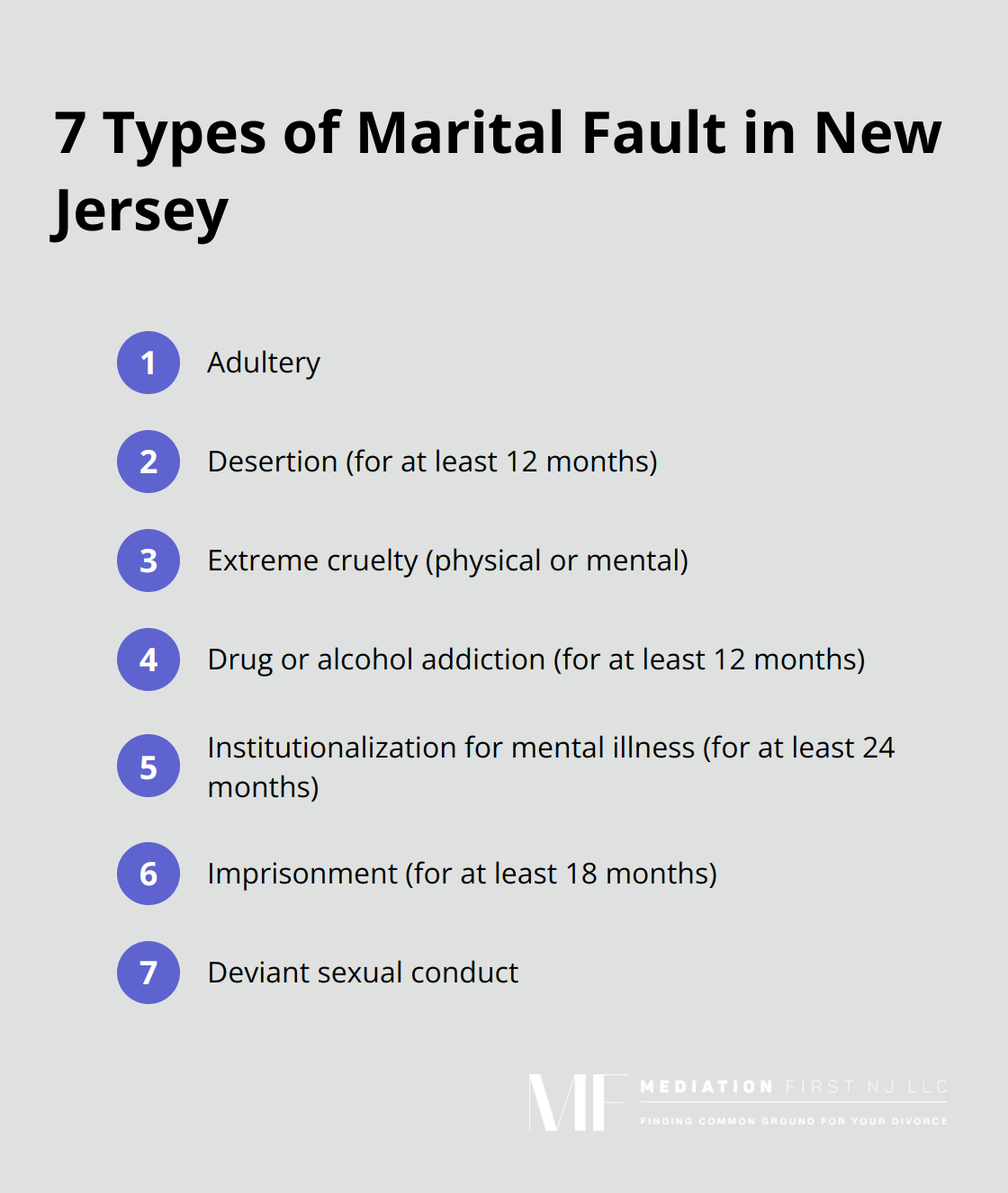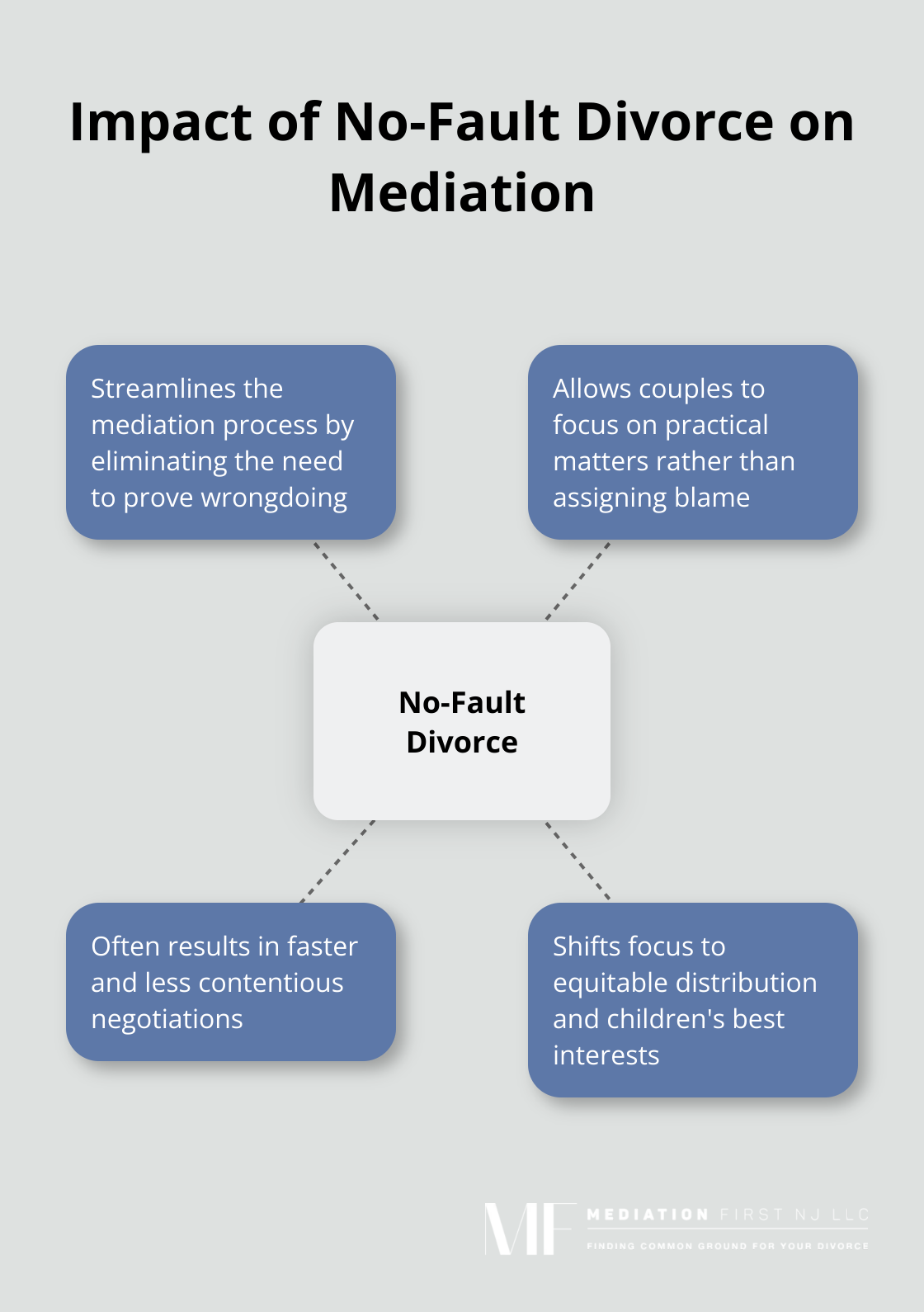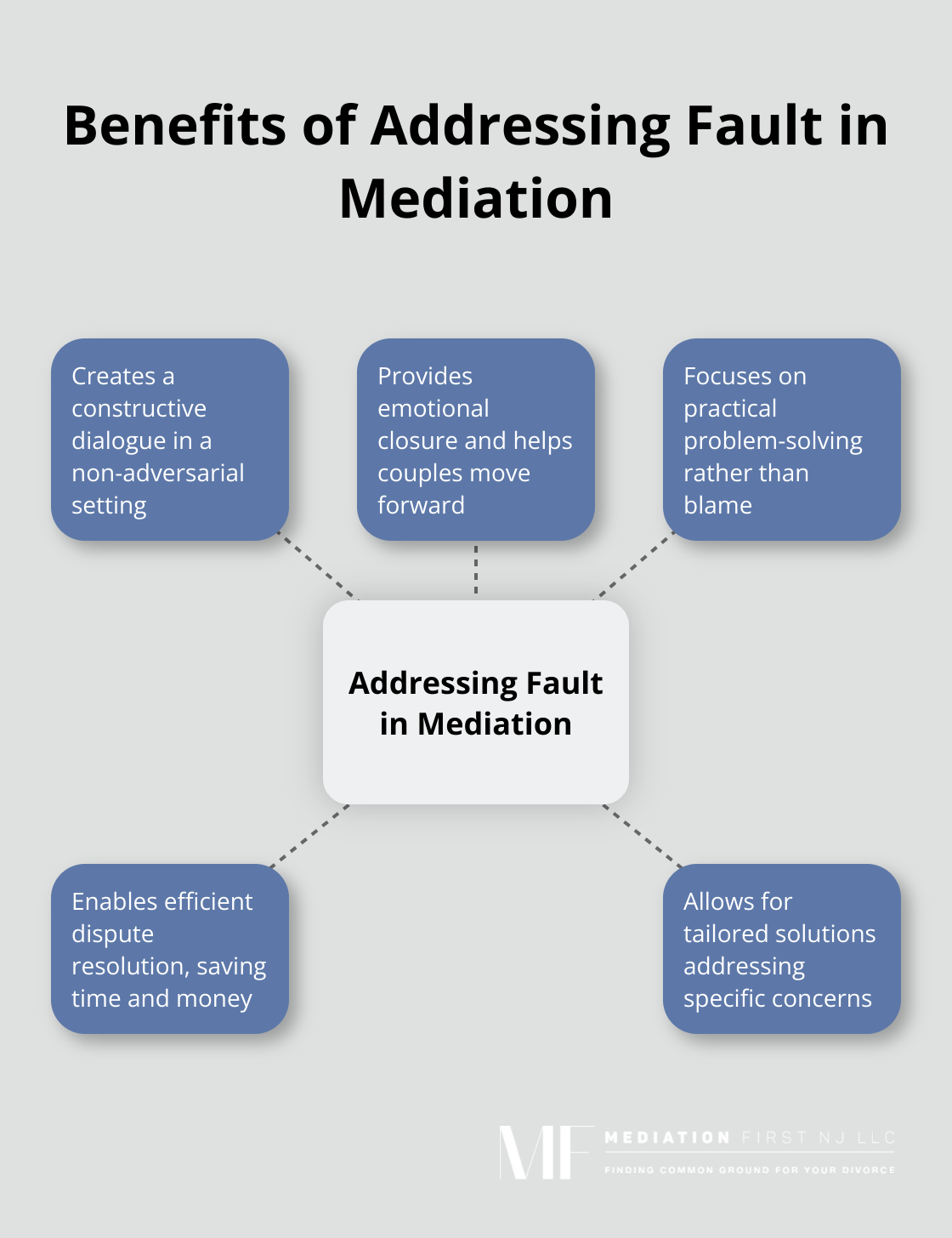Marital fault can be a contentious issue in New Jersey divorces. Many couples wonder how it might affect their mediation process.
At Mediation First NJ LLC, we often field questions about the role of fault in divorce proceedings. This blog post will explore the impact of marital fault on New Jersey divorce mediation and how it can be addressed effectively.
What Is Marital Fault in New Jersey Divorces?
Definition of Marital Fault
In New Jersey, marital fault refers to specific behaviors or actions by one spouse that lead to the breakdown of a marriage. While New Jersey allows for no-fault divorces, understanding marital fault can still influence certain aspects of divorce proceedings.
Types of Marital Fault in New Jersey
New Jersey recognizes several grounds for fault-based divorce. These include:

It’s worth noting that while these grounds exist, they’re not as commonly used as they once were. The divorce rate in New Jersey currently stands at approximately 2.7 divorces per 1,000 population.
Historical Context and Current Trends
Historically, proving fault was necessary to obtain a divorce. However, New Jersey introduced no-fault divorce, allowing couples to cite “irreconcilable differences” as grounds for divorce without assigning blame.
Despite this shift, marital fault can still influence certain aspects of divorce settlements. For example, if one spouse’s adultery led to significant financial losses, a court might consider this when determining alimony or asset division. However, the impact is often limited and case-specific.
Fault in Mediation
In mediation, the goal is to reach a fair agreement without court intervention. While fault may come up if relevant to specific issues, it’s generally not the focus. Instead, mediators help couples address practical matters like property division, child custody, and financial support.
Understanding marital fault in New Jersey divorces is important, but it’s equally crucial to recognize its diminishing role in modern divorce proceedings. As we explore how fault intersects with mediation, we’ll see why a forward-looking approach often leads to more satisfactory outcomes for all parties involved.
How Fault Impacts New Jersey Divorce Mediation
The Shift to No-Fault Divorce
No-fault divorce has been an option in New Jersey for over a decade, allowing couples to cite irreconcilable differences as grounds for divorce. This option has gained popularity, with the vast majority of divorces filed in the state now being no-fault. No-fault divorce streamlines the mediation process by eliminating the need to prove wrongdoing. Couples can focus on practical matters rather than assigning blame, which often results in faster and less contentious negotiations.

Limited Influence on Property Division
While fault can theoretically affect property division decisions, its impact is often minimal in practice. New Jersey follows equitable distribution laws, which aim for a fair (not necessarily equal) division of marital assets. In rare instances, marital misconduct that led to significant financial losses might be considered during property division discussions. For example, if one spouse spent substantial marital funds on an extramarital affair, a mediator might help the couple address how to account for those expenditures.
Alimony Considerations
New Jersey law permits courts to consider the grounds for divorce when determining support. However, this is just one of many factors and rarely becomes a decisive element. In mediation, the focus shifts more towards each spouse’s financial needs and abilities rather than past behavior. Mediators help couples navigate these discussions with an emphasis on future financial stability for both parties.
Child-Related Decisions: Prioritizing Best Interests
When it comes to child custody and support decisions, fault plays an even smaller role. New Jersey courts (and by extension, mediators) prioritize the best interests of the child above all else. Unless the fault directly impacts a parent’s ability to care for their child (such as ongoing substance abuse issues), it typically doesn’t factor into custody arrangements. Child support calculations rely on a set formula that considers income and parenting time, not marital conduct.
Moving Forward in Mediation
While fault may arise during mediation sessions, skilled mediators guide couples to focus on constructive solutions rather than dwelling on past grievances. This approach often leads to more sustainable agreements and sets the stage for positive co-parenting relationships. As we explore in the next section, addressing fault issues in mediation can provide unexpected benefits for both parties.
Benefits of Addressing Fault in Mediation
While fault may not play a significant role in the legal aspects of divorce, addressing it in mediation can offer several benefits:

Creating a Constructive Dialogue
Mediation offers a unique platform to address fault-related concerns in a structured, non-adversarial setting. When couples discuss issues like infidelity or financial misconduct openly, it often leads to more productive negotiations. This open dialogue can help clear the air and reduce lingering resentments that might otherwise impede progress.
A recent case illustrated this point: a couple struggling with trust issues stemming from financial infidelity found that addressing these concerns directly in mediation led to a more transparent discussion about asset division. This openness ultimately facilitated a fairer settlement agreement.
Emotional Closure and Moving Forward
The acknowledgment of fault can serve as a critical step in the emotional healing process. A study addressed two main questions: (a) Are adolescent sons and daughters exposed to sensitive maternal disclosures after divorce with similar frequency, and (b) Are there gender differences in adolescents’ adjustment to divorce in relation to maternal disclosures?
In mediation, couples are encouraged to express their feelings about past events in a controlled manner. This expression often results in a sense of being heard and understood (which can be invaluable for emotional closure). Couples frequently experience a shift in perspective after these discussions, transitioning from blame to a more forward-looking mindset.
Practical Problem-Solving
While addressing fault, mediators direct couples towards practical solutions rather than dwelling on past grievances. This approach aligns with New Jersey’s focus on equitable distribution and the best interests of children in divorce cases.
For instance, if financial misconduct has occurred, instead of assigning blame, couples can develop strategies to address any resulting imbalances in asset division. Similarly, when discussing parenting plans, the focus remains on creating arrangements that benefit the children (regardless of past marital conduct).
Efficient Dispute Resolution
Addressing fault constructively in mediation often allows couples to resolve their disputes more efficiently than in adversarial court proceedings. This approach not only saves time and money but also lays the groundwork for more positive post-divorce interactions, especially important for co-parenting relationships.
Tailored Solutions
Mediation provides the flexibility to craft solutions that address the specific concerns related to fault in each unique case. Unlike court proceedings, which may have limited options, mediation allows for creative problem-solving that takes into account the nuances of each situation.
Final Thoughts
Marital fault plays a limited role in New Jersey divorce mediation. The shift towards no-fault options has changed divorce proceedings significantly. Mediation focuses on practical solutions and moving forward, rather than assigning blame for past grievances.
Mediation offers a unique opportunity to address emotional issues related to marital fault constructively. It creates a safe space for open dialogue, allowing couples to work through their feelings and reach understanding and closure. This process often leads to more satisfactory outcomes and a smoother transition into post-divorce life.
Professional mediation services can make a significant difference in the divorce process and outcome. At Mediation First NJ LLC, we guide couples through divorce mediation with empathy and expertise (prioritizing open communication and collaboration). Our approach empowers couples to make informed decisions about their future, regardless of past marital faults.

